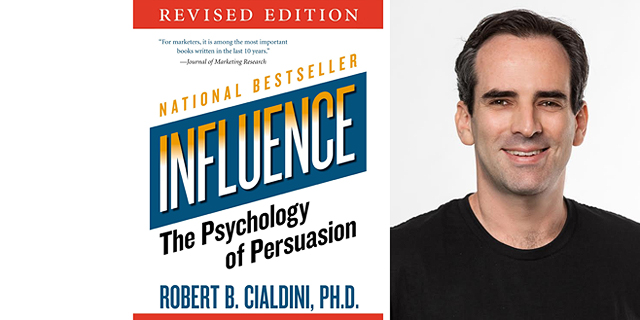
BiblioTech
CTech’s Book Review: Discovering the six principles of persuasion
Aviv Canaani, VP Marketing at DataRails, shares his insights after reading “Influence: The Psychology of Persuasion” by Dr. Robert B. Cialdini
Aviv Canaani is the VP of Marketing at DataRails. He has joined CTech to share his review of “Influence: The Psychology of Persuasion” by Dr. Robert B. Cialdini. Here, he outlines how the tools of persuasion also relate to developers
Title: Influence: The Psychology of Persuasion
Author: Dr. Robert B. Cialdini
Format: Book
Where: Home
Summary:Cialdini's book, “Influence: The Psychology of Persuasion”, written in 1984, is about how you can influence other human beings. Despite how it might seem, this book isn't about how you manipulate people - it's a book about how to become more persuasive. Dr. Cialdini defines six principles of persuasion and uses great examples that are fun to read, even for people who don’t work in tech or the business world (yes, they do exist).
Important Themes:
The six principles of persuasion as defined by Cialdini are: reciprocity, consistency, social proof, liking, authority, and scarcity.
- Reciprocity: If you help other people, or buy them gifts, they would feel obligated to pay you back. Has anyone ever bought you a beer? Did you later feel like you owed them? That’s the oldest trick in the book.
- Commitment and Consistency: As human beings we make a lot of decisions on a regular basis and we want to feel like we know what we're doing. Where are you on the Android/iOS debate? After arguing for your preferred mobile operating system with a friend, how truly open are you to switch alliances in the future?
- Social Proof: We're all suckers for following recommendations. Did you ever pick an item off a menu just because it was the most popular one at Yelp? And when's the last time you ordered something from Amazon that had less than a 4-star rating?
- Liking: If you like someone, there's a better chance you'd buy from them. Ever wondered why email marketing, especially by startup companies, has become much more cute and personal over the years?
- Authority: We trust people who we feel are experts in their fields. Have you ever checked out a software just because someone you follow on LinkedIn recommended it?
- Scarcity: We want things that are harder to get or are in short supply. Ever bought something just because it was on special sale for a limited time? Did you get the feeling that if you won’t buy the product now then you’d miss out? If you think this doesn’t apply to you, do the words “Black Friday” ring a bell?
As a marketer, I find myself coming back to this book for ideas. For example, last year I was VP Marketing at Workiz, a field service management software. We were facing a challenge - we had only one review on the leading business review site, G2. We knew many prospective clients go to that site before making a buying decision (based on the principle of “Social Proof”). We had to figure out a way to get more reviews from our customers, something we failed to do in the past. We decided to leverage two persuasion principles: “Liking” and “Reciprocity”. We added a pop up to users of our software with a note from our co-founder who was also a service professional in the past. The text said: “Hi X, It’s Dan. As the owner of a home service business you know how important reviews are to your small business. As we’re growing, we also need more reviews. Can you spend 5 minutes writing a review about Workiz on G2? To thank you for your time, we’ll send you a $50 Amazon gift card.” This campaign got us dozens of new reviews, crowning us as the leader in our category.
It would be a disservice to classify this book as a nonfiction book for marketers and salespeople. “Influence” gives very practical advice for any human being who engages with other human beings. This book has made me not only a better marketer, but also a better husband, father and friend. I also added it to the syllabus of my “Startup Marketing” course which I teach at Reichman University.
Critiques:Cialdini tries to simplify the art of persuasion into just six principles. That’s a bold attempt, but also what made this book a best-seller is that it is a fun, easy-to-read book. Thirty seven years have passed since this book came out and Cialdini, who probably read hundreds of critiques of this book, was open to making adaptations. He published an updated version in 2006 and another one recently in May 2021, where he adds a 7th principle - Unity.
Who Should Read This Book?
Anyone who ever failed to persuade a friend/colleague/spouse/child to do as they wished. So yes, it’s for everyone.